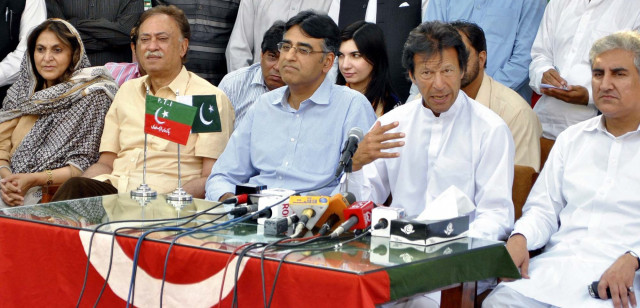PTI fears Pakistan may need a bailout package soon
Says the country on the verge of default due to rapidly worsening economic situation

PTI leader Asad Umar. PHOTO: EXPRESS
“It is almost confirmed now that the country will need another bailout package from international creditors by next year,” said PTI’s Asad Umar, a member of National Assembly Standing Committee on Finance while giving his party’s position on the current economic situation on Tuesday.
Pakistan on the verge of seeking IMF bailout, experts claim
He came down hard on Finance Minister Ishaq Dar for ‘bringing the economy to its knees’ within four years and urged the government to take emergency measures to avoid any untoward situation on the economic front.
He said the PTI’s support for a bailout programme would depend upon the terms of the agreement between Pakistan and the IMF. Umar predicted that the IMF would not be soft on Pakistan this time due to change in mood in Washington.
Umar said despite worsening economic conditions particularly of the external sector, the PML-N government would not immediately seek an IMF bailout package, as it was in a state of denial. He said the bailout could come either from China or the IMF.
After coming to power in June 2013, the PML-N government had entered into a three-year arrangement with the IMF for a $6.2 billion bailout programme to avoid looming default at the time.
PML-N will not need another IMF bailout, says Dar
“There is an imminent default risk as external debt payments are rising sharply but the foreign exchange earnings are declining,” said Umar.
He said the biggest mistake that Dar committed was that he put taxes before the economic growth, which was contrary to the economic theories that suggest that growth generates revenues.
Umar said that contrary to Ishaq Dar’s public rhetoric of signing a Charter of Economy by all the political parties, he never presented any concrete proposal at any forum, including parliament. “The political parties are mature enough to give unanimous response on any issue that affects the country,” Asad said.
He said the PML-N government increased its revenues by primarily relying upon indirect taxes, which affected the poor the most and reduced the tax burden of the rich. He said direct taxes collection was only 1.3% of Gross Domestic Product (GDP), which once used to be 6%.
IMF approves $497m loan for Pakistan after bailout review
He said the IMF never stopped the government from levying taxes on rich, as the PML-N itself backtracked from its promise of bringing 200,000 rich and affluent people in the tax net.
“Although, Pakistan’s economy is facing extreme challenges, there are still solutions to the problems,” said Umar, who is being perceived as economic wizard of the PTI. “Pakistan can overcome its external sector challenges by reviving exports and curtailing imports.”
Pakistan closed the last fiscal year at a record current account deficit of $12.1 billion and a record budget deficit of Rs1.863 trillion. Umar said contrary to its election manifesto, the PML-N government had taken maximum loans, which he estimated at a whopping Rs10.8 trillion. This includes actual loans taken during past four years and Ministry of Finance’s projections of loans for new fiscal year.
He said Pakistan’s external debt and liabilities have mounted up to a record $79 billion at the end of the fourth year of the PML-N government –an addition of net $18 billion in four years.
“The Latin American countries have defaulted because of the private sector external debt, as the final obligation for making these payments is that of the central bank,” he added.
The loans being taken by the PML-N government are more than the loans cumulatively taken during the nine years of General Musharraf and five years of the PPP government, according to a presentation that Umar shared with a group of journalists.
Due to the government’s wrong policies the exports have been on decline for consecutive four years, which had never happened before in the country’s history. Similarly, the investment-to-GDP ratio always declined compared to the previous tenures whenever the PML-N government came into power.
He said that the government’s claim that exports also went down in other regional countries was incorrect, as exports of Bangladesh and India increased during past four years.
“The main reasons for decline in Pakistan’s exports are high cost of doing business due to expensive electricity, gas and blockage of genuine refunds of the exporters,” he added.


















COMMENTS
Comments are moderated and generally will be posted if they are on-topic and not abusive.
For more information, please see our Comments FAQ